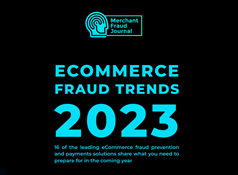This article, featuring Vesta's CFO, Shim Steinmetz, is a reprint from PYMNTS.com. The original article by PYMNTS.com can be found here.
Fraud is a two-way street, eating away at merchant bottom lines while also disrupting the end-user experience.
“As people increasingly do business and transact online, card spend is shifting more to card-not-present, which introduces a higher degree of fraud,” Shimon Steinmetz, CFO at automated risk assessment and fraud prevention solution Vesta, told PYMNTS in a recent discussion.
PYMNTS’ research finds that the average FinTech loses $51 million to fraud every year, representing around 1.7% of annual revenue, with many businesses losing even more than that to bad actors.
Authentication and risk assessments need to happen in the blink of an eye without hammering approval rates, Steinmetz said, otherwise the fraudsters win.
“[Fraud protection] benefits the merchant by increasing profitability and reducing fraud rates and operational costs, and it benefits the customer who gets authenticated and not rejected because they’re wrongly perceived to be a risk,” he added.
Delivering a frictionless customer experience is one of the top reasons why companies are increasingly investing in fraud prevention.
PYMNTS’ own research finds that more than 8 out of 10 CFOs (85%) are prioritizing fraud controls for incoming payments.
That’s because fraud is a near-universal problem, making solving for it a key competitive advantage.
“If you’re a merchant today you have to have a digital strategy, you just do,” Steinmetz said. “That’s why these fraud solutions are only becoming more important ... They need to stay ahead of these global changes in consumer consumption.”
Driving Payments With Lowest Fraud Rate Possible
Fraud can come in many flavors.
When asked whether the strategies of bad actors vary across geographies, Steinmetz widened the aperture. “I can’t comment on criminal behavior in Latin America versus North America — but I can tell you bad actors are bad actors, and geographically patterned behavior can be identified, tracked, and addressed regardless of geography. We train our system for each vendor based on their traffic patterns, their customer patterns.”
PYMNTS research found that nearly half of companies (49%) view verifying the identities of new business customers as a significant challenge needing to be addressed.
After all, providing a full range of money mobility to account holders and end-users is critical to business success and a key engine for growth.
“When a company has low approval rates, they’re basically leaving money on the table and turning customers away,” Steinmetz said. “And our mission, whether it’s over 18 months, three years, five years — what we want to do is drive payments through merchants at the lowest fraud rate possible, full stop.”
Still, he noted that Vesta’s business and revenue is a function of payment value and a function of global commerce. “As CFO, I’m watching how the consumer is behaving, because everything else follows from there.”
He added that the beauty of the movement to credit cards, from a consumer standpoint, is that if something goes wrong, they can simply call their provider and get the money back.
“But the issuing bank and the merchants who actually eat the cost of the fraud, that hurts their bottom line,” he said. “That’s why Vesta’s solution that gives both a better risk score and backstops every transaction sits at such a sweet spot. We are betting on our technology, betting that the house is stacked in our favor.”
He noted that, of course, when Vesta believes the risk of a transaction is too high to guarantee the cost, it won’t get approved.
Steinmetz said that even in a challenging macroclimate like today’s, where individual consumer consumption rates may be contracting as spending slows, Vesta’s value proposition to merchants is even better. “If you engage with our platform, we will increase your authentication rate and drive more money into your door, those merchants that aren’t already our customers are going to see the same slowdown, and we can help them increase their own revenues.”
After a recently announced (Feb. 27) partnership with Mastercard to provide fraud management solutions for merchants across the Asia-Pacific (APAC) region, Steinmetz says that Vesta’s products have never been more relevant.
As for what he’s most excited about?
“Taking advantage of the consumer shift to online payments and maximizing the power of our platform to drive dollars for merchants,” Steinmetz said.
.png)
.png)
%20(1).png)
.png?width=960&height=502&name=Shim%20PYMNTS%20interview%20(3).png)


